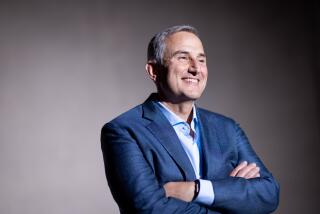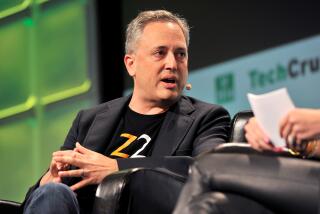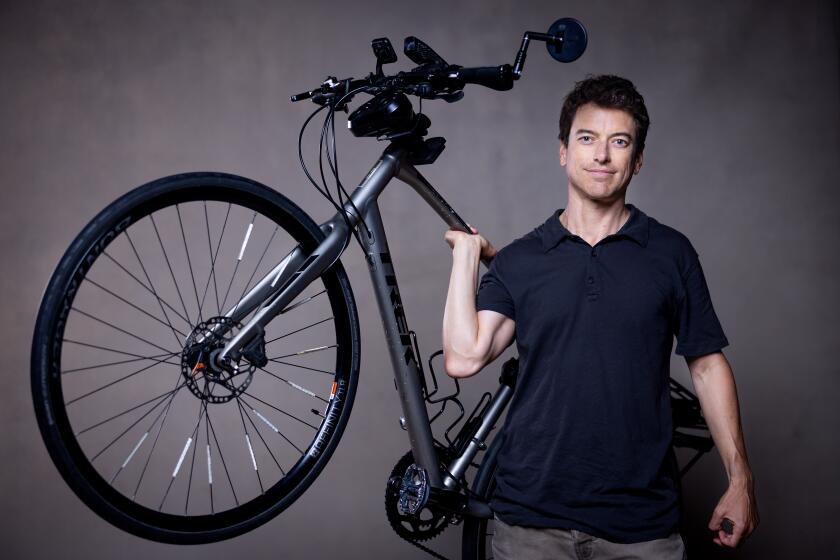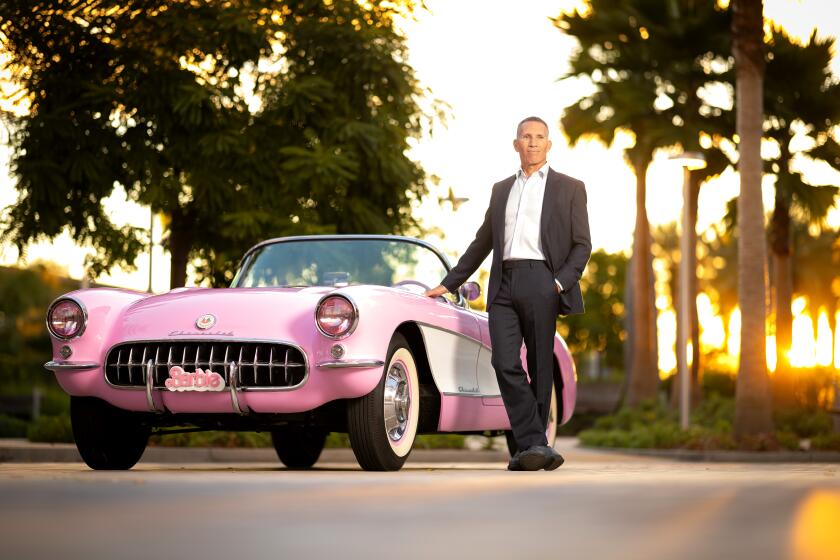
A red phone sits on Palmer Luckey’s desk at the Costa Mesa headquarters of his military tech company, Anduril Industries.
The phone is a genuine article from the U.S. nuclear command, once connected to the network that led to the bunkers dug into the Rockies west of Colorado Springs that could order up the apocalypse. Luckey owned the red phone before he started Anduril, back when he was only famous for inventing the Oculus virtual reality headset in a trailer in the driveway of his childhood home in Long Beach, then selling that company to Facebook for $2 billion at age 21.
Discover the changemakers who are shaping every cultural corner of Los Angeles. This week we bring you The Disruptors. They include Mattel’s miracle maker, a modern Babe Ruth, a vendor avenger and more. All are agitators looking to rewrite the rules of influence and governance. Come back each Sunday for another installment.
Back then, the phone was just kitsch, a physical piece of history he could gaze at as he worked on VR for a social media company. But after he donated $10,000 to an anti-Hillary Clinton political group in the fall of 2016, then got fired from Facebook a few months later, the red phone changed from a prop to a proposition. Flush with cash, unemployed and annoyed at Silicon Valley, he decided to become a military mogul — possibly the first whose office uniform is a Hawaiian shirt, cargo shorts and flip-flops.
“That was the dream, to be the guy with the red phone who gets The Call,” Palmer, now 31, said in an interview at Anduril’s headquarters.
He founded his new enterprise with four others. One had worked with Luckey at Oculus, but the remaining three came from Palantir, the intelligence analytics software company founded by Peter Thiel, the billionaire tech investor and right-wing political donor. When Thiel founded Palantir in 2003, he named the firm after the magical seeing-stones from Tolkien’s “Lord of the Rings.” Luckey followed in Thiel’s footsteps. Anduril is the elvish name of the reforged sword of Aragorn, king of men and hero of the forces of good in Tolkien’s epic. Translated into English from Quenya, the name means “Flame of the West.” A replica of the sword from the “Lord of the Rings” films hangs on the wall in Anduril’s office.
“The first page of our first pitch deck said that Anduril is a company that will save Western civilization by saving taxpayers hundreds of billions of dollars a year as we make tens of billions of dollars a year,” Luckey said.
“We’re not making tens of billions of dollars a year yet,” he said, “but we’re getting there.”
Six years later, Anduril has signed well over $1 billion in public contracts with the U.S. and allied governments and raised more than $2 billion in venture funding. Last year, it brought in around $500 million in revenue, according to investor presentations reported by the Information.
Of those contracts, $250 million are with the U.S. Border Patrol, which is in the process of deploying a network of 189 Anduril sensor towers to form a “virtual border wall” of semiautomatic surveillance across the U.S.-Mexico border. Another $100 million is with the Australian navy, which hired Anduril to build submarine drones. Its biggest deal came in 2022, when the U.S. Special Operations Command awarded a 10-year, billion-dollar contract to Anduril for counter-drone defense systems that combine sensors, AI software and drones like Anduril’s Anvils, which can physically ram enemy drones to knock them out of the sky.
‘We are preemptively being invited to conversations to help solve problems — most companies will just never get that call.’
— Palmer Luckey
Luckey’s company has also developed a tube-launched drone with a “loitering munition” model (a.k.a. an exploding drone) and bought a rocket engine manufacturer in Mississippi that makes propulsion systems for hypersonic missiles. In late 2023, it unveiled a jet-powered drone that could be flown multiple times for surveillance missions, or equipped with a warhead for suicide missions. In April, Anduril beat out Boeing, Lockheed Martin and Northrop Grumman in an Air Force competition for a new autonomous fighter drone that can fly alongside manned warplanes like robot wingmen.
That red phone on Luckey’s desk isn’t connected to a live line — but he is undoubtedly getting The Call.
“We are preemptively being invited to conversations to help solve problems — most companies will just never get that call,” Luckey said. “It’s the dream come true for someone with my ideological bent.”
Luckey’s bent, at least when it comes to business, runs counter to the last few decades of America’s economic development. When he was working at Facebook and trying to scale up the production of the Oculus headset in Chinese factories, he started to believe that something had gone seriously wrong.
“I felt that we lived in a unique period of U.S. history where we had allowed our technological innovation apparatus to be completely hijacked by a foreign power: China,” Luckey said. “Almost none of the major tech companies in the United States were willing to work with the DoD in a major way, because doing so would get them locked out of China, Chinese capital, Chinese markets, Chinese manufacturing.”
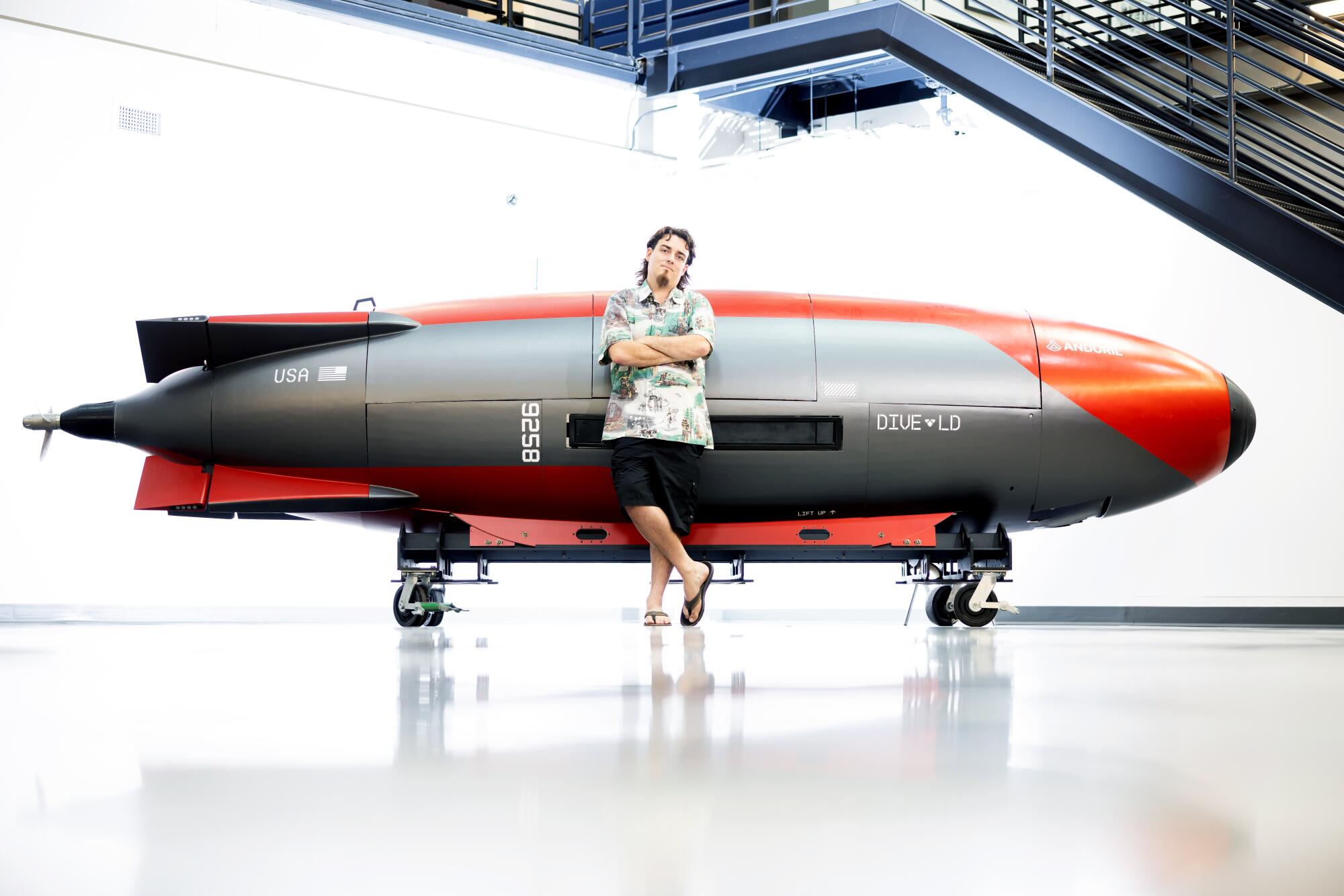
“Apple could not pivot away from China even in the event of World War III,” Luckey said. “So you get to this weird situation, I realized, where these people who are supposed to be the most powerful people in the country are actually handcuffed and prohibited from saying anything that they might believe,” including criticizing the Chinese government’s mass detention of Muslim minorities. “If you’re the CEO of Apple, you can’t go out and say, ‘I think concentration camps are wrong, no matter where they are.’ I looked at that and said, ‘Oh my God, this is terrifying.’”
This line of thinking was considered fringe in the tech industry in 2016, when Luckey left Facebook, but after COVID-19 pandemic supply-chain disruption and wars in Europe and the Middle East, a growing slice of the tech industry has switched to Luckey’s point of view, emphasizing the need to bring manufacturing back to U.S. shores — or at least U.S. allies — and disentangle from the Chinese economy.
Luckey’s enthusiasm for working with the military was unpopular for much of the last decade, but his basic pitch for Anduril is classic Silicon Valley: Use software, venture capital money and a new business model to disrupt an industry full of lumbering incumbents. He and his co-founders thought that they could tap tech talent to bring machine vision and other AI technologies to military operations, and outflank the defense giants of Lockheed Martin, Raytheon, General Dynamics, Boeing and Northrop Grumman — known as the five “primes” in the industry — by pitching the military on a new way to pay. Instead of billing on a cost-plus basis, where the government covers all the costs of development and manufacturing, plus a little profit margin on top, Anduril talks to Department of Defense decision-makers up front, uses its own capital to develop new software and drones, and then sells the finished product to the military.
The company is not profitable, and has no intention of becoming profitable in the next few years. “We should not be profitable” in the near future, Luckey said. “We should be taking all of the money that we’re making and putting it back into growing the company, launching new product lines, trying to become the next major defense prime.”
It was an uphill fight to secure his first round of funding. Investors would tell him, “We love your people, we love your tech. You’re very patriotic, you’re very smart, but we don’t think you can actually get the government to buy your stuff.”
“I pointed out to people that every defense company that had been founded by a billionaire was a success,” Luckey said, referring to Elon Musk’s SpaceX and Thiel’s Palantir. “I hate that we live in a country where that’s the case, but I realized that I had a unique responsibility as one of the very few people who was willing to work on national security and blessed with the resources to actually make a real go at it.”
Luckey has also used those resources to give millions to Republican political candidates and committees across the country, drawing criticism from a number of his peers in the tech industry, who tend to lean toward Democrats over the GOP.
‘I’m supporting the people who are generally very pro-innovation and national security.’
— Palmer Luckey
In the 2020 cycle, Luckey and his wife poured nearly $3 million into the coffers of Republican Party committees and congressional candidates in 45 states, and threw in $1.7 million for Donald Trump’s campaign on top. That October, Luckey also hosted a reported $100,000-a-person fundraiser for Trump, with the candidate in attendance, at his waterfront home on the tip of Newport Beach’s Lido Isle.
His political giving has kept up in the years since. In the 2021-22 cycle, federal election records show Luckey donated over $1.4 million to Republican committees and candidates. In 2023, he donated an additional $726,000. His sister, Ginger, is married to Rep. Matt Gaetz (R-Fla.).
“I’m supporting the people who are generally very pro-innovation and national security,” Luckey said. He doesn’t see a contradiction in building weapons for the Ukrainian army and supporting members of a political party that has been wobbly in its support for the war. “They are almost universally very supportive of using Ukraine as an opportunity to show Russia that they are not gonna get away with being an expansionist regime,” he said.
“At the end of the day, I would love it if I could only give money to the politicians who agree with me on everything, and only to the groups that agree with me on everything. Unfortunately, I have not found those groups.”
Earlier this month, Luckey again co-hosted a fundraiser for Trump in Newport Beach. Combined with other events in the region, it was expected to raise about $27.5 million for the presumptive Republican nominee’s campaign committee.
Besides running a company, Luckey has a growing collection of toys to occupy his time. An 82-foot boat used by the Navy SEALS called the Mark V Special Operations Craft floats at the end of the dock outside his Lido Isle house, visible on Google Maps’ satellite view.
Through a series of LLCs with names such as Luckey Arms, Luckey Air Transport and Luckey Ground Technology, he owns a couple of submarines, a Black Hawk helicopter and a fleet of motorcycles and cars. On the day we met, he drove a Tesla stripped of all paint to the bare aluminum to work. He drove a 1990s Mazdaspeed Autozam converted to electric drive and skinned hot pink with graphics from the anime series “Gun Gale Online” to the annual Anime Expo at the L.A. Convention Center last summer. During his time at Facebook, the Wall Street Journal reported that he would drive a military Humvee to the Menlo Park, Calif., offices, complete with fake guns in its machine-gun mount.
Real guns are also a hobby. “I have a huge number of guns. Massive collection of guns.” His main interest is failed gun designs, stabs at innovation that led to technological dead ends. “I will say I’ve got the extreme machine gene,” Luckey said.
And then there are the nuclear missile silos. “I own a lot of ICBM sites all over the United States.” Corporate filings show that a decommissioned Atlas ICBM silo in rural Saranac, N.Y., is owed by Black Omen LLC, which is in turn managed by Fiendlord’s Keep LLC, whose chief executive is listed as Palmer Luckey.
Luckey would not confirm nor deny his ownership of that site, but he did say that he’s in the process of collecting the entire U.S. ground-based nuclear deterrent system. His goal, he says, is to turn it into a vast museum.
“There are so many air museums, quite a few naval museums and ship museums, and there’s literally only one missile museum in the United States, the Titan II in Tucson, Arizona,” he said. “It’s just kind of weird that one of the three pillars of the nuclear triad has just been completely ignored by all the people that build museums. So I’m collecting those and restoring them.”
Like the red phone, only bigger.


